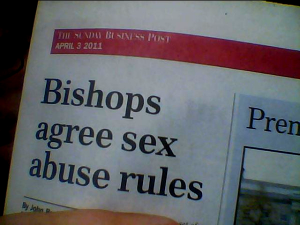The current issue of the online journal Intereconomics features stories about the politics of adjustment in Greece, Ireland, Spain, Italy, and Portugal. Aidan Regan and I contributed the article about Ireland. Each paper outlines the measures that have been taken in recent years, and the major challenges each country now faces. All five countries share many common features of course, including the difficulty of keeping on track with deficit reduction targets in the context of no growth and truly awful unemployment figures. But the challenges discussed by authors are quite varied too: in Greece, for example, it’s governance problems that are highlighted; in Portugal and Italy, productive capacity and export performance; in Spain, problems over sustaining the revenue base of the state.
In Ireland’s case, we outline the ongoing problems involved in trying to reduce the large government deficit. We also note that the legacy of the financial crisis complicates Ireland’s recovery strategy. The government has staked a great deal on getting some relief on a portion of the deficit and debt issues that arise from recapitalizing the banks. What the government is looking for at the moment is not a debt restructuring or a default by this or any other name, but a rescheduling of a portion of the costs of unwinding the full liabilities of the now-defunct Anglo Irish Bank. From the Irish point of view, the ECB has given mixed signals on this: positive indications about the design of the ESM in June 2012, but in September, a statement that was construed by UCD Professor of Economics Karl Whelan as ‘Germany to Spain and Ireland: Drop Dead’.
Yet the backroom diplomacy continued, and the government certainly seemed to that that an agreement would be possible before the next critical deadline for Ireland of 31 March. Right now though, things are not looking so good. There are fears that, as in other areas of crisis management, there is a tendency for EU decision-makers to pull back from new commitments unless crisis is staring them straight in the face. ‘They are under-performing again’, a senior EU official said in December. Even as Germany reported a downturn in economic activity earlier this month, José Manuel Barroso said that ‘the existential threat against the euro has essentially been overcome’. Well, that’s alright then.
For all that, the game is not over yet in Ireland’s negotiations with the ECB. The Irish Congress of Trade Unions has taken up the case too. With the call to ‘Lift the Burden: Jobs not Debt‘, it’s calling for protests on 9 February. We’ll wait and see.



